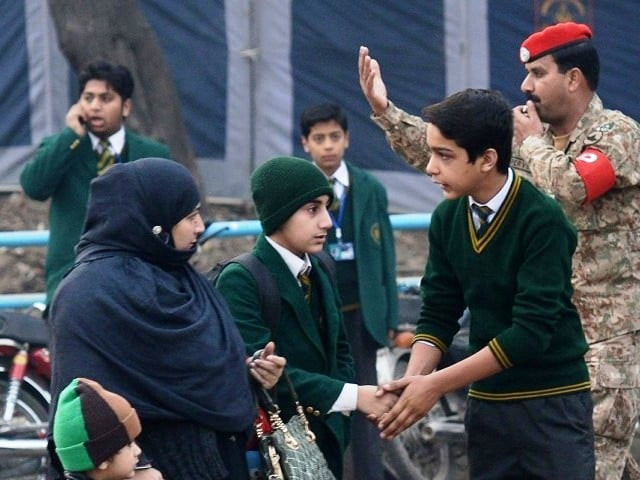December 16, 2014, left the Pakistani nation with horrible memories. This nation is resilient; it has faced many tragedies but manages to survive every time. But how can the people directly affected by such attacks start living their lives normally?
We all cried for those innocent children who left us. Yes, it was big loss for a country that already lacks in basic education facilities, as compared to the rest of the world. But what about those children who experienced the attack and survived? What will happen to those hundreds of prodigies? Will they be able to perform the way society requires them to?
It’s been a month since the attack and we, the people who had no direct relation to those children, are still mourning. Such was the magnitude of this tragedy. If it still affects such, can you imagine what a child who went through this must be feeling?
Do you remember being a student? Do you remember the feeling of going back to school after winter break? Crisp new uniforms, cardigans, stationery and books – this was all that was on our minds. And of course, seeing our friends again after a long break.
Now imagine yourself as a student again and replace that excitement with fear, the anticipation with anxiety and the feeling of dread at the thought that many of your friends will not be there.
A child’s mind is fragile as it is; I wondered how children can cope with this trauma. To get a better perspective, I contacted a board certified child and adolescent psychiatrist Dr Sangeeta Chitlu, trained from Howard University and University of Maryland and currently practicing in Virginia. I asked her about coping with tragedy from a psychiatric and mental health perspective.
According to Dr Chitlu, the children who endured or were exposed to the shooting will show signs and symptoms which will include fear, anger, sadness, numbness, confusion and isolation from others. She said that irritability or reckless behaviour has also been observed in victims of such incidents. Some children might feel guilty because they survived and others did not, or because they failed to save others from dying. They might have frequent complains about headaches or stomach aches. Anxiety, caused by separation and depression, are some of the main symptoms that these children may develop.
She further explained that in the immediate aftermath, there is a condition known as an Acute Stress Disorder that may develop in the survivors. Symptoms like intrusive distressing memories, hyper-vigilance, nightmares, sleep problems, dissociative behaviour and/or avoidant behaviour may also be seen. According to her, in many cases, it can develop into a Post Traumatic Stress Disorder (PTSD) if the symptoms continue to exist after a month or so. In some incidences, the symptoms of PTSD take several months to develop. So it is possible that a month after the attack, a child survivor might seem completely normal but could start showing symptoms after some time.
According to Dr Chitlu,
“Those children who will return to the school, especially to the same building, will suffer from anxiety, fear and sadness. These conditions can affect their academic performance and friendships with other children.”
Going back to school after losing friends, teachers and sibling is hard enough, but going back to the same place is worse because it can trigger a lot of horrible memories. Every classroom, hallway and auditorium will be a constant reminder of their loss.
That was one of the reasons why Sandy Hook Elementary School in Connecticut, where 20 children and six adults were murdered on December 14, 2012, was shut down forever. Perhaps Army Public School (APS) should build a new campus too or shut down the part of the building where these horrendous crimes occurred.
I asked Dr Chitlu about the mental state of those children who have lost their siblings. She said that depending on the age of the younger siblings who lost their older ones, a wide range of symptoms can develop such as regressive behaviours like loss of bowel control or being excessively clingy and childlike. They might be concerned that something similar could happen to them too. Upon losing the sibling in the attack, they are at risk of developing depression, severe anxiety and panic attacks. They will need some additional attention but unfortunately since the parents are grieving too, they might not be available for emotional help.
Their academic performance will be impacted negatively after such a gruesome attack. Children may have a tougher time focusing and concentrating on the task given to them. Impulsivity and decreased motivation may further interfere with school performance.
The mainstream media and social media were flooded with the graphic images and videos which might have impacted the children living in different cities. They must have felt the pain for their young fellow citizens. But constantly viewing graphic images is detrimental to a child’s mental health. In the Sandy Hook Elementary School shooting, no such images of students or the crime scene were shown. Their media reported the incident thoroughly without having to broadcast blood stained uniforms and classrooms. On social media, we witnessed images of dead bodies in the school. If a child watches this, whether a survivor or any child in our country, can you imagine the effect on his or her mind?
According to Dr Chitlu, repeated viewing of such news should be limited by the parents. As mentioned above, younger children might believe it will happen again. Also, they may feel guilty for having survived. Older ones may get upset, agitated, and excessively sad when they watch the tragedy or the aftermath on social media. It might be more helpful for parents to be available to talk to them if they have questions on the shooting. It is best to answer them as factually as possible.
The treatment that Dr Chitlu suggested is psychiatric therapy. Evidently, supportive therapy and trauma-based Cognitive Behavioural Therapy (CBT) can be helpful for traumatised kids. It will be important to include parents in the sessions. Group therapy is often helpful in situations when several people have been exposed to a stressor of this magnitude. In some cases, medications might be helpful especially for those with sleeping problems or with symptoms of anxiety, depression and low functioning. The parents or families should seek professional help if victims develop any suicidal or homicidal ideations.
Furthermore, she said that parents and teachers can collectively play a powerful role during these tough times. The parents of affected children may also have PTSD symptoms that require therapeutic attention. In such families, extended family members and neighbours can step in to help out. Supportive listening, validating children's feelings and making them feel protected will go a long way in supporting the affected children. Trying to keep their lives as normal and routinely as possible, with the same kind of routines that they were followed will be helpful too. Sometimes parents may avoid talking to children about the tragedy which can hinder the children from getting better as they might be bottling up the feelings inside.
If I were a child and a survivor of this calamity, I think the only thing that would help me get over this would be to keep myself busy in the daily routine of schoolwork and studying. The moral support of my family and society would be crucial to help me move on.
A month on, we need to show our support for these children and help them cope with the trauma that this tragedy has brought upon them. We need to show them that their loss has not been forgotten. The most important role is that of parents, teachers and mental health professionals. It should be a societal effort to save the future of the country otherwise Pakistan will become the most depressed nation around the globe.
A month later, helping the survivors of the #PeshawarAttack
Going back to school after losing friends and sibling is hard enough, but going back to the same place is worse.



COMMENTS
Comments are moderated and generally will be posted if they are on-topic and not abusive.
For more information, please see our Comments FAQ